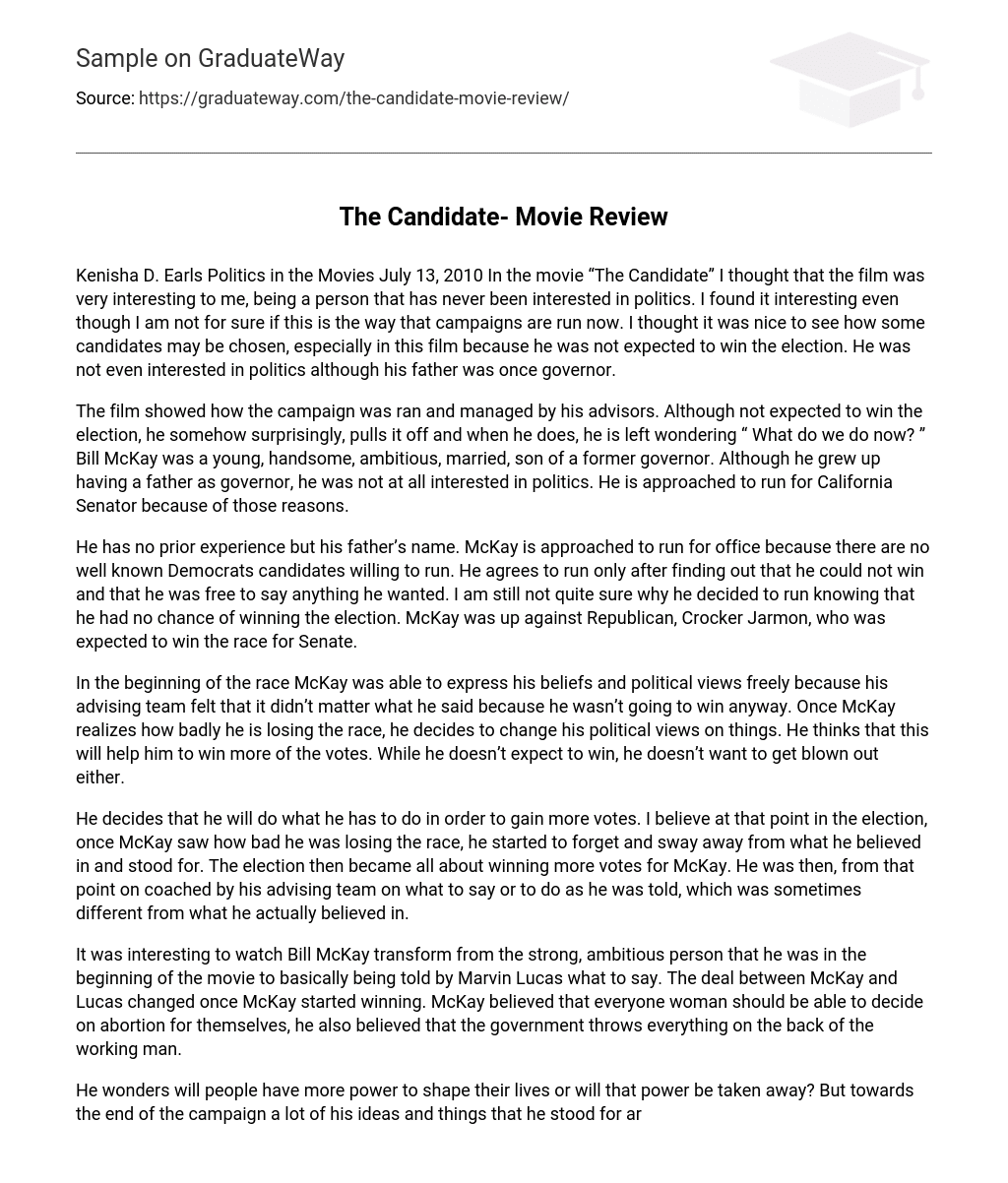Kenisha D. Earls Politics in the Movies July 13, 2010 In the movie “The Candidate” I found it intriguing despite my lack of interest in politics. I was fascinated by the portrayal of campaign methods, although unsure if they still apply today. I appreciated the insight into how candidates can be chosen, particularly in this film where the protagonist had unconventional odds of winning the election. It was remarkable to witness his disinterest in politics, despite his father’s past role as governor.
The film depicted the management of the campaign by Bill McKay’s advisors. Despite not being expected to win, he manages to surprise everyone by successfully winning the election. However, upon winning, he finds himself pondering about the next steps. Bill McKay, a young and attractive individual with ambitious traits, is the married son of a former governor. Despite growing up with a political figure as his father, he lacks interest in politics. Due to these specific qualities, he is approached to run for California Senator.
Despite lacking prior experience and relying solely on his father’s name, McKay is unexpectedly approached to run for office. This opportunity arises as there are no prominent Democratic candidates willing to campaign. Intrigued, McKay agrees to run only after learning that victory is unlikely, but he can freely express his thoughts. The decision to participate in an election with no prospects of winning remains unclear. Nevertheless, McKay faces off against the favored Republican candidate, Crocker Jarmon, in the Senate race.
Initially, McKay had the freedom to openly express his beliefs and political views. His advisers believed that his statements were insignificant since they did not expect him to win the race. However, as McKay witnesses his opponents dominating the race, he opts to alter his political stance in order to garner more votes. Although winning seems unlikely, McKay aims to avoid a complete defeat.
McKay’s determination to obtain additional votes led him to compromise his principles and beliefs. The election shifted its focus solely towards securing more votes for McKay, leading him to be influenced by his advisory team’s instructions on what to say and do, even if it contradicted his personal convictions.
Bill McKay’s transformation throughout the movie was captivating to observe. He initially displayed confidence and drive, but ultimately became controlled by Marvin Lucas. The dynamic between McKay and Lucas shifted after McKay achieved success. One of McKay’s strong beliefs was advocating for women’s freedom to choose regarding abortion. Additionally, he felt that the government often burdens the working class.
The protagonist reflects on the potential increase or decrease of people’s autonomy in their lives. Nonetheless, as the campaign progresses, numerous original ideas and values are discarded and substituted with more widely appealing ones. In my perspective, the film primarily focuses on the management of political campaigns and how politicians essentially promote themselves to the public. It was captivating to witness McKay initially embracing a particular stance, only to see his message undergo a transformation by the conclusion of the movie.
Political candidates can modify their positions to appeal to voters, suggesting that their identity and beliefs may not be significant. McKay was initially uninterested in politics but got involved due to his father’s reputation, despite his initial reluctance. However, by the end of the movie, McKay had a change of heart. He realized that people interpreted his father’s absence from his campaign as support for Jarmon, whereas McKay simply didn’t want him involved. To address this perception, McKay approached his father and shared his concerns. In response, his father publicly declared support for him and showed more backing. This likely bolstered McKay’s popularity among voters since it wouldn’t reflect well if a former governor and one’s own father didn’t endorse them.
It is astonishing to witness the extent politicians will go in order to secure victory, even if it entails falsehoods or manipulation of their supporters. McKay transitions from street basketball in the projects to California beaches, and even engages in tea parties with the Senior Citizens Club, aiming to secure the votes of these diverse groups. It is likely that he tailors his message to each group, appeasing their individual desires.
While I have been aware of politicians lying, I never realized the extent to which they could potentially fabricate their entire campaign and true beliefs. This reminds me of my past experiences watching a Presidential debate on TV and observing different campaign advertisements. I have always been curious about candidates accusing each other of lying or changing their stance on certain issues after previously supporting a different viewpoint.
After watching the movie, I started questioning whether politicians engage in “flip flopping” to appeal to a wider audience and secure more votes. It’s disheartening to consider that the individuals we rely on to advocate for our rights, beliefs, and interests might only be doing so to convince us to vote for them, without genuinely upholding their stated principles. Once they are in power or elected, they frequently disregard their commitments.
Maybe the film aims to educate people like me who lack knowledge about the complexities of a campaign race and how candidates can be selected and manipulated to become the perfect choice, appealing to voters. It raises doubts in my mind about the existence of individuals like “McKays” who willingly engage in the entire campaign process without any real desire to be elected.
Taking on this task seems immense and daunting, with little motivation. However, it did provide McKay an initial chance to voice his beliefs and convey his values by addressing various audiences. It brings me great dismay and frustration to realize that politicians are willing to deceive and compromise their integrity for the sake of being elected, even though they may have never aspired to hold office. Hopefully, this notion exists solely within the realm of fiction.





